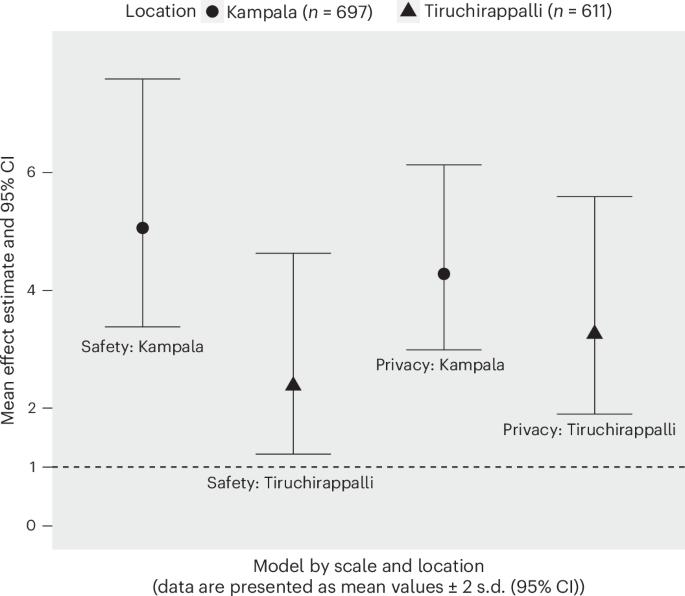Sanitation-related withholding and suppression among women in urban Uganda and India
IF 24.1
引用次数: 0
Abstract
Despite sanitation facility availability, perceived privacy, safety and security, and health status and risks may prevent toilet use, particularly for women. Women may withhold food and water (withholding) or suppress urination and defecation urges (suppression) to cope, though evidence on the prevalence and drivers of these behaviours is limited. This secondary analysis of data generated as part of the Measuring Urban Sanitation and Empowerment project (n = 2,173) assesses the prevalence of withholding and suppression among urban women in Kampala, Uganda and Tiruchirappalli, India, and associations with perceived sanitation-related privacy, safety and security, and health status and risks (withholding analytic sample, 1,308; suppression analytic sample, 862). Witholding was reported by 38% (265/697) of women in Kampala and 16% (100/611) in Tiruchirappalli; more than 93% of women in both populations (Kampala, 415/440; Tiruchirappalli, 336/350) reported suppression. Privacy, safety and security, and health scores were all significantly associated with the odds of withholding in both cities. Fewer significant results were found from linear regression analyses assessing privacy, safety and health scores and suppression, suggesting other, unaccounted-for influences. The results suggest that sanitation-related privacy, safety and health conditions should be addressed programmatically to improve women’s sanitation-related circumstances and behaviours. As a result of unsupportive sanitation environments, women may cope by suppressing urges to urinate and defecate or by not eating food and/or drinking water. Among urban women in Uganda and India, nearly all women surveyed reported suppressing urination and defecation urges. Withholding food and water was less common. Perceived privacy, safety and health influenced these coping behaviours.

乌干达和印度城市妇女与卫生有关的扣留和压制。
尽管有卫生设施,但人们认为隐私、安全和保障以及健康状况和风险可能会阻止人们,特别是妇女使用厕所。妇女可能会扣留食物和水(扣留)或抑制排尿和排便的冲动(抑制)来应对,尽管关于这些行为的普遍程度和驱动因素的证据有限。作为衡量城市卫生和赋权项目(n = 2,173)的一部分,对产生的数据进行了二次分析,评估了乌干达坎帕拉和印度蒂鲁奇拉帕利城市妇女中扣留和压制的普遍程度,以及与感知到的卫生相关隐私、安全和保障以及健康状况和风险之间的关联(扣留分析样本,1,308;抑制分析样品,862)。据报告,坎帕拉38%(265/697)和蒂鲁奇拉帕利16%(100/611)的妇女有隐瞒行为;两国人口中超过93%的妇女(坎帕拉,415/440;Tiruchirappalli, 336/350)报道了抑制。在这两个城市,隐私、安全和保障以及健康得分都与隐瞒的几率显著相关。从评估隐私、安全和健康得分和抑制的线性回归分析中发现的显著结果较少,这表明还有其他未解释的影响。结果表明,应通过方案处理与卫生有关的隐私、安全和卫生条件,以改善妇女与卫生有关的情况和行为。
本文章由计算机程序翻译,如有差异,请以英文原文为准。
求助全文
约1分钟内获得全文
求助全文

 求助内容:
求助内容: 应助结果提醒方式:
应助结果提醒方式:


